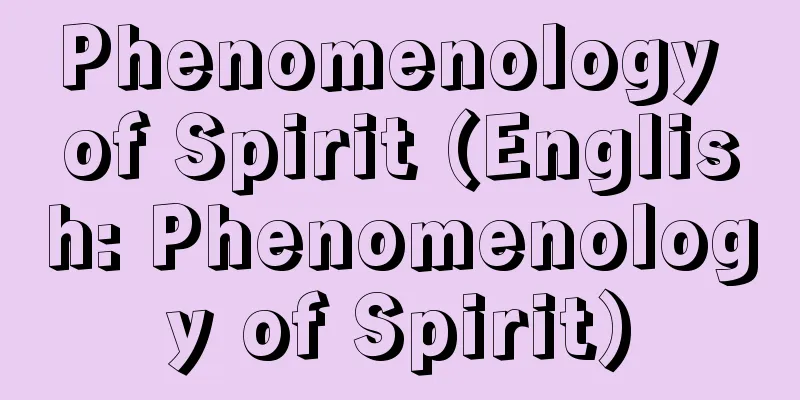Phenomenology of Spirit (English: Phenomenology of Spirit)

|
One of the major works of Hegel, who is considered the master of German idealist philosophy. This work can be said to be the starting point of Hegel's systematic thought, and is so rich in content that it can be said to encompass all of his early thought and his subsequent systematic thought. It was published in Jena in 1807. This work was originally titled "The Science of the Experience of Consciousness," but the title was later changed to "Phenomenology of Spirit." The book is made up of six chapters: "Consciousness," "Self-Consciousness," "Reason," "Spirit," "Religion," and "Absolute Knowledge." In this book, Hegel "dialectically" traces all of the typical forms of objective objects and subjective consciousness. In so doing, he demonstrates that objects and consciousness are ultimately united to form a whole, and that within this whole the "Absolute" as infinite life, that is, "Spirit," manifests itself. This process of demonstration is also the path through which we experience our inseparable unity with the "Absolute." It is one of the great classics in the history of European philosophy, which continues to have a major influence to this day. [Mamoru Takayama] "Phenomenology of Spirit, volumes 1 and 2, translated by Kaneko Musashi (1971, 1979, Iwanami Shoten)" ▽ "Phenomenology of Spirit, translated by Kashiyama Kinshiro (included in The World's Great Thoughts: Hegel, 1973, Kawade Shobo Shinsha)" ▽ "Hegel's Phenomenology of Spirit, by Kaneko Musashi (1973, Ibunsha)" ▽ "Hegel's Phenomenology of Spirit, by W. Marx, translated by Uezuma Sei (1981, Risosha)" ▽ "An Introduction to Hegel's Phenomenology of Spirit , by R. Norman, translated by Miyasaka Makihiro (1982, Ochanomizu Shobo)" ▽ "An Introduction to Hegel's Phenomenology of Spirit , edited by Kato Naotake (1983, Yuhikaku)" Source: Shogakukan Encyclopedia Nipponica About Encyclopedia Nipponica Information | Legend |
|
ドイツ観念論哲学の大成者とされるヘーゲルの主著の一つ。本書はヘーゲルの体系的思想の出発点ともいうべき著作であり、彼の初期思想および以後の体系期の思想のいっさいを包括しているともいいうるほど、内容豊かな著作である。1807年イエナで出版された。本書は初め『意識の経験の学』という表題で書き進められたが、のち『精神現象学』の題名に変更された。 全体は、「意識」「自己意識」「理性」「精神」「宗教」「絶対知」の6章からなる。ヘーゲルは本書において、客観的な諸対象および主観的な意識の典型的なあり方のいっさいを「弁証法的に」たどる。それによって、対象と意識とが究極的に統一され、一つの全体を形成し、この全体において無限な生命としての「絶対者」、すなわち「精神」が、現象することを証示する。この証示の過程はまた、われわれが「絶対者」と不可分に一体であることを経験する道程でもあるのである。ヨーロッパ哲学史上で、今日に至るまで大きな影響を与えている有数の古典の一つとなっている。 [高山 守] 『金子武蔵訳『精神の現象学』上下(1971、79・岩波書店)』▽『樫山欽四郎訳『精神現象学』(『世界の大思想 ヘーゲル』所収・1973・河出書房新社)』▽『金子武蔵著『ヘーゲルの精神現象学』(1973・以文社)』▽『W・マルクス著、上妻精訳『ヘーゲルの「精神現象学」』(1981・理想社)』▽『R・ノーマン著、宮坂真喜弘訳『ヘーゲル「精神現象学」入門』(1982・御茶の水書房)』▽『加藤尚武編『ヘーゲル「精神現象学」入門』(1983・有斐閣)』 出典 小学館 日本大百科全書(ニッポニカ)日本大百科全書(ニッポニカ)について 情報 | 凡例 |
>>: Psychosurgery - Seishingeka (English spelling) psychosurgery
Recommend
Temporary
…Before the revolution, it was the capital of Eri...
Ofunato [city] - Ofunato
A city in the southeastern part of Iwate Prefectur...
Kiyohara Yorinari - From Kiyohara
Year of death: Bunji 5, leap year 4, 14 (1189.5.30...
Maritime traffic management
...Artificial restrictions on the free movement o...
Pilot system - Unkoushiseido
…The staff of the deck, engine, and radio departm...
Sign - Asho
〘noun〙① A document promising something in the futu...
Xicagou Ancient Tombs - Xicagou Tombs (English spelling)
A group of ancient graves on a hill about 500m nor...
Cymothoa eremita (English spelling)
…It is commonly found along the coast of Japan. I...
Bundesgerichtshof
...The methods of handling cases and legal theori...
Jukichi Uno - Jukichi Uno
Born: September 27, 1914, Fukui [Died] January 9, ...
Stefan George
German poet. Born in the suburbs of Bingen, his f...
Sioux City
A city in the western tip of Iowa, USA. Population...
Conring, Hermann
Born: November 9, 1606 in Norden Died: December 12...
Kinetochore
…Other proteins that are involved in the polymeri...
Soami
Year of death: 1525 Year of birth: Unknown. A memb...









